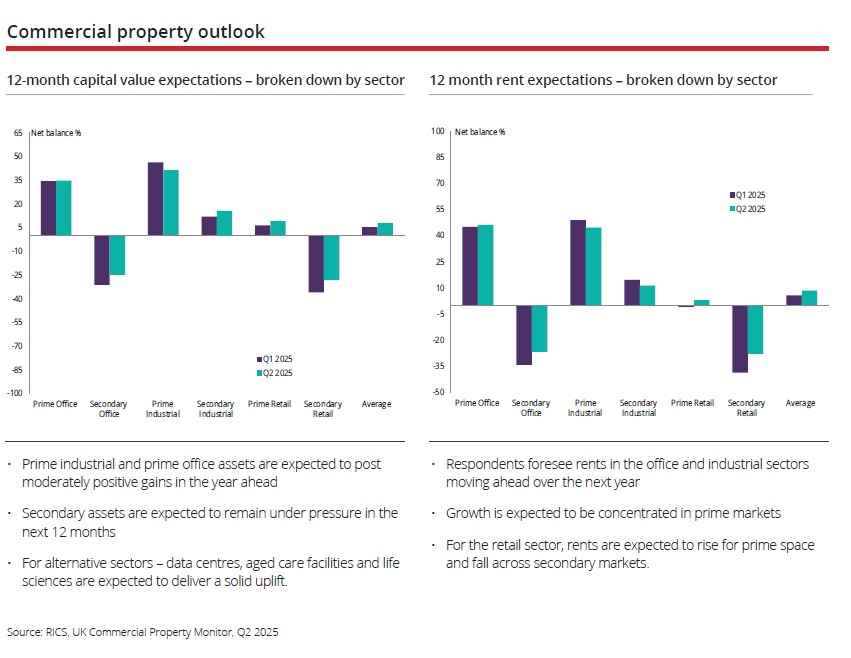
Commercial Property Market Review – October 2025
| Prime yields remain stable at 5.9%, signalling resilience and predictability in a cautious investment environment | Hotel investment surged 28% year-on-year, driven by strong single-asset deals and renewed investor confidence in London | Scottish market investment dipped 21% but quality assets and international buyers continue to drive solid demand |
Monthly market update
The latest data from Savills reflects a commercial property market that could either be considered as stable or sluggish.
The figures indicate a commercial market that is holding its ground against a backdrop of ongoing economic and political uncertainty. Since February, the average prime yield has remained steady at 5.9%, suggesting a degree of predictability despite wider market pressures. While four sectors are showing a downward trend, seven sectors have not changed for at least 18 months. While this may spark concern about stagnation, it could also offer reassurance for investors who are prioritising consistency.
There are some positive signs for the market. In the second quarter of this year, commercial property investment reached the second-highest level recorded in the past 13 quarters. Looking ahead, Savills predicts that, by the end of 2025, total investments volumes for office and industrial sectors will exceed the 2024 total.
Increased investment in hotel sector
UK hotel investment showed strong growth in the third quarter of this year according to Savills.
Total hotel investment reached £1.04bn in Q3, marking a 28% year-on-year increase. This growth was largely driven by single asset transactions, which represented 92% of all activity and was nearly 60% above the ten-year average for Q3.
London was the investment hotspot in Q3, with total volumes rising by 42% year-on-year to £697m. Savills suggested that this strong performance was due to the capital’s large share in hotel stock combined with a rebound in investor appetite.
David Kellet at Savills commented, “While the first half of the year was defined by operational and investor uncertainty in the UK hotel market, sentiment has stabilised through Q3.” He added, “We expect the single asset market to remain robust whilst also anticipating more larger portfolios to transact in 2026.”
How’s the Scottish market faring?
Analysis from Knight Frank shows a total of £1.46bn was invested in Scotland’s commercial property market during the first three quarters of 2025.
Although this represents a 21% decline compared with the same period last year (£1.85bn), it remains broadly in line with the average levels for Q3 during 2020-2024.
So far this year, retail is the sector that has attracted the highest volume of investment, totalling £452m. The industrial sector also performed strongly, recording its second-best third quarter since the pandemic, with completed deals worth £153m. International investors are on track to have their highest share in investment since 2022, accounting for 45.9% of deals in the first three quarters of the year.
Alasdair Steele at Knight Frank observed, “Fewer deals are happening, but the assets that are trading hands tend to be higher quality buildings in prime locations and are attracting a good deal of interest.”

The place of AI in commercial property
Artificial intelligence (AI) is being adopted across the commercial real estate sector in a variety of ways, transforming how the industry operates.
The technology is increasingly being used to enhance efficiency and support decision-making. AI systems can analyse years of market data in just minutes, helping underwriters to generate faster valuations and enabling asset managers to assess the potential impact of interest rates and policy changes. This frees up professionals to focus on other tasks, such as client relationships and strategy planning.
AI is not just adopted by market analysts; it can also be used in the commercial properties themselves. For example, smart systems are helping to reduce energy use and improve comfort by automatically adjusting heating and cooling systems based on real-time data. CBRE explained, “By harnessing machine learning, building managers can now see weeks in advance when a system might fail, preventing tenant disruption and lowering costs.”
All details are correct at the time of writing (22 October 2025)
It is important to take professional advice before making any decision relating to your personal finances. Information within this document is based on our current understanding and can be subject to change without notice and the accuracy and completeness of the information cannot be guaranteed. It does not provide individual tailored investment advice and is for guidance only. Some rules may vary in different parts of the UK. We cannot assume legal liability for any errors or omissions it might contain. Levels and bases of, and reliefs from taxation are those currently applying or proposed and are subject to change; their value depends on the individual circumstances of the investor. No part of this document may be reproduced in any manner without prior permission
